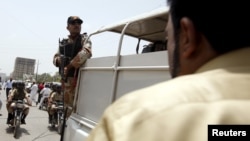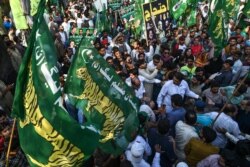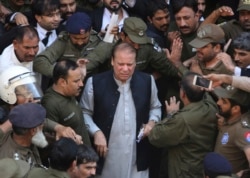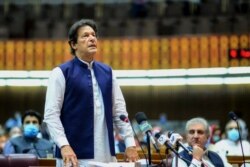An alliance of opposition parties in Pakistan has accused the military of kidnapping the most senior police official of a province to force him to arrest an opposition leader.
"This is what the chief minister (of Sindh province) told me — the word, kidnapped. I asked him again. He said yes, he was picked up and taken to the sector commander's (local military commander's) office," Muhammed Zubair, a senior leader of the opposition party Pakistan Muslim League-Nawaz, said in an audio message shared by a local journalist on Twitter and shared in multiple WhatsApp groups in Pakistan.
The accusation was later repeated in Karachi during a press conference of the Pakistan Democratic Movement, a newly formed anti-government alliance of nine major opposition parties.
Ali Zaidi, a senior government minister, strongly refuted the accusation in a tweet.
"M.Zubair selling nonsense narrative that CM Sindh told him IG was kidnapped & forced to register FIR (police report)," he said.
The military's public relations wing has not responded to VOA's request for comment.
The allegation has raised the temperature of an already politically charged environment in the country, days after the PDM launched a nationwide campaign to oust Prime Minister Imran Khan.
Sharif's accusations
In its first rally last week, Nawaz Sharif, a thrice-elected former prime minister who was ousted on corruption charges, openly used the strongest language against the military by a mainstream politician in almost half a century.
Calling out the army chief by name, Sharif accused him of toppling his government, rigging elections, kidnapping and torturing journalists, and forcing the judiciary into obedience.
"General Qamar Javed Bajwa ... you rejected the public's choice and installed this incompetent government of your choice. So, you are responsible for the problems the country is facing," he said via video link from London, where he is staying for medical treatment.
The alliance's major demands include fresh elections and noninterference of the military in politics.
Khan and his party deny these allegations and say that the entire campaign has been aimed at pushing the government into dropping corruption investigations against senior opposition leaders.
"All the parties that have undemocratic structures are equating eight (corruption) cases to democracy. Provincial resources that should have been spent on the people are being spent on the cases of these leaders," tweeted Fawad Chaudhry, a senior minister in Khan's Cabinet.
Last month, military spokesman Maj. Gen. Babar Iftikhar told local TV channel ARY News that the army chief wanted the army to be kept away from political affairs.
Khan's government faces a challenge as a faltering economy, rising inflation and a negative growth rate have turned public opinion against it. Many in the public blame the military for bringing him in.
Military power
The military is considered the most powerful institution in the country and has ruled Pakistan directly for almost half of its existence. It is still believed to control the most important affairs, including foreign policy.
While many Pakistani politicians acknowledge the military's control of government affairs in private conversations, few criticize the institution openly in public.
Sharif's criticism was therefore considered a milestone in Pakistani politics but was not shown on mainstream television news channels. International media rights organizations have documented increasing censorship and harassment of the media in Pakistan, including the beating up or enforced disappearances of journalists.
The PDM has threatened to launch a long march on the capital if the current government does not step down and hold fresh elections.







